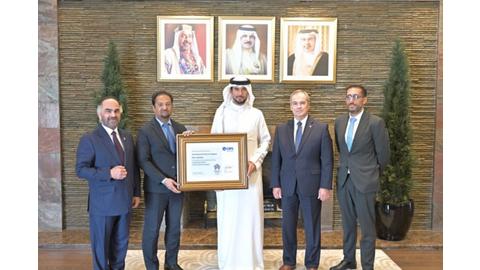Saudi Arabia’s booming startup ecosystem

If you’re an ambitious entrepreneur with a breakthrough commercial proposition, this is a good time to be in Saudi Arabia. Within a relatively short space of time, the Kingdom’s startup ecosystem – particularly in the tech arena – has matured quickly and dramatically.
Whereas the KSA’s pre-2016 startup funding rate was about $8 million per annum, that figure leapt to just over $150 million in 2020 (a 35 percent year-on-year increase) and is seeing exponential growth in 2021, according to business research firm Magnitt.
Kholoud Al-Mohammadi of Impact46 (a Riyadh-based venture capital and private equity firm) told Arab News there are two main drivers behind this shift. “First, you have consumer adaptation to technology. And the second element is the change in regulations and the support of regulatory bodies.”
On the consumer side, the KSA has a young, tech-savvy population with a big appetite for online services – making it attractive for marketeers. In terms of regulatory changes, a key aspect of Vision 2030 is the empowerment of entrepreneurs. Foreign direct investment (FDI) has been eased and 2018 saw the launch of the Monsha’at-backed Saudi Venture Capital Company (SVC) and the PIF’s Jada fund of funds.
These public funds work alongside a range of private investors, both global and local – from 500 Startups (a leading US VC firm now targeting MENA and the KSA); to Saudi VC funds including Saudi Telecom’s STV, Raed Ventures, Riyad TAQNIA Fund and Riyadh Valley Company; and KSA-based angel networks such as Oqal.
The Commission for Small and Medium-sized Businesses now also provides an online portal for fundraising, connecting private investors with startup founders.
“The concept is great”, Ahmed Alnafie of the design and marketing startup Invenu told Arab News. “It allows all the funding institutions to get back to you through a single unified portal, and aggregates investors so you don’t have to approach them one by one.”
This can help startup founders without a personal network of family and friends to invest in their ventures – something that has traditionally held back potential Saudi entrepreneurs lacking the right connections.
Such initiatives have helped grow a culture of entrepreneurship in the Kingdom that is reflected in the findings of a recent report from the Prince Mohammed Bin Salman College of Business and Entrepreneurship (MBSC) along with the Babson Global Center for Entrepreneurial Leadership (BGCEL).
Among Saudis surveyed for the GEM report, 90 percent agreed or strongly agreed it is easy to start a business, placing the Kingdom in top position among GEM economies. Saudi Arabia also reported the highest rate of market confidence, with 80 percent seeing opportunities to start a business as a result of the changes brought about by the pandemic.
That was born out last year, when, despite the challenges of COVID-19, Saudi Arabia’s total rate of startup activity increased from 14 percent of the population in 2019 to 17 percent in 2020. Entrepreneurial activity in Saudi Arabia increased by 24 percent compared with 2019.
“Saudi Arabia has been building a solid foundation for a robust entrepreneurship ecosystem over the past few years,” said Prof. Zeger Degraeve, executive dean at MBSC. “This strong footing enabled the Kingdom to remain resilient even in the face of extreme challenges stemming from the pandemic and provide required support for SMEs and startups.”
In fact, the COVID-19 pandemic has been a major catalyst for the Kingdom’s startup sector, for three reasons.
First, the pandemic forced the rapid uptake of various online platforms, as people were suddenly confined to their homes during the lockdown phase.
Second, traditionally tech-resistant sectors such as government, health care and education had no choice but to introduce online solutions – which under normal circumstances they would be wary of experimenting with given the critical nature of their activities.
And third is the access to good talent: while meetings and presentations were usually ‘live’ pre-COVID – requiring key talent to be physically present – online meetings quickly became the norm, meaning that talent can be located almost anywhere on earth. This allowed startup founders to form teams, launch and raise funds even in the midst of the pandemic.
“I know the pandemic caused a lot of businesses to fall back or have some difficulties, but it sure helped the argument for technology itself – regardless of the sector,” said Al-Mohammadi. “A process that would normally take years and years happened within a few months. The pandemic was a real testament to the need for tech-based solutions. Tech is not a luxury anymore, it’s a necessity.”
This positive mix of COVID-related factors benefitted numerous KSA-based startups, including Gamze Beauty (a provider of beauty products), Jahez (food delivery solutions), Noon Academy (educational technology) and Raqqamyah (peer-to-peer lending) – all of which either launched or raised considerable funds in the course of 2020-21.
Saudi VC funding grew by 65 percent year-on-year to reach a record SR650 million in the first half of 2021, accounting for 14 percent of VC funding across the MENA region, according to MAGNitt data.
Fintech startups were responsible for almost a quarter of transactions, while e-commerce saw a decline in its contribution to deals, as it did across the MENA region. Fintech startups raised 1,700 percent more capital year-on-year while funding into e-commerce declined by 54 percent, according to the report.
The distribution of funds in Saudi Arabia improved in uniformity as the top five deals of the Kingdom accounted for 47 percent of total capital deployed in the country, down from 81 percent in the first half of 2020.
Traditional lenders have also been increasing their financing of startups and small businesses. The financing of small, medium and micro enterprises in Saudi Arabia by banks and finance companies increased by 67.9 percent between 2018 and 2020, according to Saudi Central Bank data.
Banks increased funding to SMEs by 70 percent to SR170.4 billion in that period, while finance companies increased their lending from SR7.8 billion to SR11.9 billion, the data show.
“There is no doubt that understanding the importance of the role of small and medium enterprises is evident in the goals of Saudi Vision 2030, especially in the axis of a prosperous economy, where the vision gave ambitious goals and this began with the establishment of the Small and Medium Enterprises General Authority (Monsha’at),” Rana Zumai, a consultant who advises SMEs in Saudi Arabia, told Arab News.
“The state’s efforts and decisions have enhanced the capacity of small and medium enterprises in various aspects, such as creating jobs in the economy and improving the level of competitiveness, in addition to raising the level of employment and exports,” she said.
Vision 2030, combined with the overall push toward diversification of the Saudi economy away from oil, is opening up opportunities in entertainment, media, tourism, culture, media and biotechnology, among other areas.
“I think we’re at the start of something big”, said Al-Mohammadi. “Saudi Arabia used to be thought of as a market to expand to, but now with the new infrastructure and the new regulatory support and the local and global funding coming in, it has become validated as a startup hub.”
Source: https://www.zawya.com/mena/en/economy/story/Saudi_Arabias_booming_startup_ecosystem-SNG_231787084/


